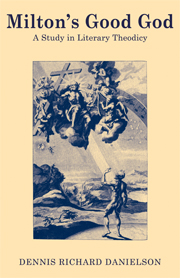Book contents
- Frontmatter
- Contents
- Preface
- 1 The contexts of Milton's theodicy
- 2 God and Chaos
- 3 Assertion and justification: providence and theodicy
- 4 Milton and the Free Will Defense
- 5 Theodicy, free will, and determinism
- 6 Eden and the “soul-making” theodicy
- 7 Paradise Lost and the Unfortunate Fall
- Epilogue
- Appendix: The unfortunate fall of Satan
- Notes
- Selected bibliography
- Index
4 - Milton and the Free Will Defense
Published online by Cambridge University Press: 04 August 2010
- Frontmatter
- Contents
- Preface
- 1 The contexts of Milton's theodicy
- 2 God and Chaos
- 3 Assertion and justification: providence and theodicy
- 4 Milton and the Free Will Defense
- 5 Theodicy, free will, and determinism
- 6 Eden and the “soul-making” theodicy
- 7 Paradise Lost and the Unfortunate Fall
- Epilogue
- Appendix: The unfortunate fall of Satan
- Notes
- Selected bibliography
- Index
Summary
Having considered the outlines of Arminianism and the historical context it provided for Milton's justification of God, we must now examine more closely the relation between theodicy and what Francis Tayler in 1641 referred to as the Arminian's “nave1l–string of free–will.” In particular, I would like in this chapter to present the so–called Free Will Defense and to emphasize its peculiarly literary roles in Paradise Lost.
As I have indicated, seventeenth–century orthodox Calvinists looked on Arminian teaching as a threat to the doctrines of divine providence and omnipotence. Samuel Rutherford, for example, claims to contend for the lordship of the creator against the Arminians, who contend for the lordship of the creature. John Owen sees theodicy as merely an excuse for the Arminians “to free themselves from the supreme dominion of … all–ruling providence” and to worship “their idoll Freewill”: “So it must be,” they say, “or else … God is unjust, and his waies unequall.” Owen later adds sarcastically: “Having robbed God of his power, they will yet leave him so much goodnesse, as that he shall not be troubled at it.” Milton's aim, as was suggested at the end of the last chapter, is to assert those two things which Owen here almost admits cannot both unequivocally be asserted: God's omnipotence and goodness.
- Type
- Chapter
- Information
- Milton's Good GodA Study in Literary Theodicy, pp. 92 - 130Publisher: Cambridge University PressPrint publication year: 1982

